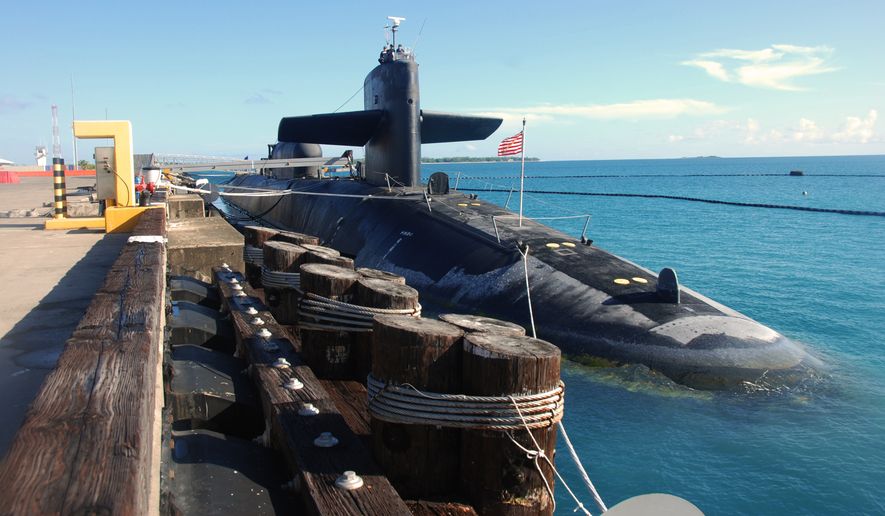It has been described as the most strategically vital U.S. military installation in the world, but the Diego Garcia air base is at the center of a bitter geopolitical fight over colonialism, national security and human rights, a fight that has pitted Washington and London against virtually the rest of the world.
The base, named for the largest island in the Chagos Archipelago in the remote waters of the Indian Ocean, sits on land claimed by the British and leased to the U.S. government for the sole purpose of operating a military base. The United Kingdom separated the islands from Mauritius, a former British colony, three years before Mauritius gained its independence in 1968.
Diego Garcia is now a part of the British Indian Ocean Territory, which critics paint as a vestige of the United Kingdom’s colonial past.
The complex arrangement has served the Pentagon well for decades. The base’s location near Asia, the Middle East and Africa makes it an irreplaceable cornerstone of America’s ability to project power around the world. Diego Garcia served as a launch pad for U.S. bombers during the invasion of Afghanistan in 2001 and Iraq in 2003.
But Mauritius has mounted a concerted international push in recent years to reclaim the 17-mile-long island. Its argument is that it was forced to hand over Diego Garcia and other Chagos islands to the British six decades ago as the price of its independence.
The U.N. General Assembly, Pope Francis, international courts and a host of other stakeholders support those claims. They say the islands must be returned to Mauritania, a step that would seem to put the future of the Diego Garcia air base into question.
“To us, it is a matter of incomplete decolonization,” Jagdish Dharamchand Koonjul, Mauritius’ permanent representative to the United Nations, said last week at a panel discussion hosted by the Center for the National Interest.
“It is a matter that is deeply rooted in history,” the ambassador said. “For any country to be able to maintain a colonial system in this century is, I think, totally unacceptable. We would like the U.K. to talk both to the U.S. and to Mauritius, and I think together the three countries should be able to come to a solution that takes into account the needs and interest of each one of us.”
The argument about colonization stems from Britain’s claim over the physical islands and the forcible resettlement of the roughly 2,000 native inhabitants of Diego Garcia, known as Chagossians, to make room for the air base.
Mr. Koonjul stressed that the Mauritian government does not intend to resettle Chagossians on Diego Garcia. If his country regains control of the island, he said, it would offer the U.S. a 99-year lease to maintain its military base and pledge that little would change in practical terms for the Pentagon.
’Critical role’
The Trump administration is standing firm against those arguments. State Department officials told The Washington Times that the U.S. “unequivocally supports U.K. sovereignty” over the islands and suggested that a change in ownership of Diego Garcia could have a negative impact on American security.
“This joint facility plays a critical role in maintaining regional and international peace and security. Its status as a U.K. territory is essential to the value of the joint U.S.-U.K. base on Diego Garcia and our shared security interests,” a State Department official said. “The specific arrangement involving the facilities on Diego Garcia is grounded in the uniquely close and active defense and security partnership between the United States and the United Kingdom. It cannot be replicated.”
The ferocity with which the U.S. and the U.K. guard Diego Garcia has only added to the secrecy surrounding the base. The facility has long been a focus of conspiracy theories, including wild speculation that the missing Malaysia Airlines Flight 370 was virtually hijacked by the U.S. military and remotely piloted to Diego Garcia.
Conspiracy theories aside, international opinion is clearly aligned against the U.S. and Britain. In February 2019, the International Court of Justice offered an advisory opinion that Britain’s decolonization of Mauritius was not completed lawfully because of the continued claims over the Chagos Archipelago.
Shortly afterward, the U.N. General Assembly affirmed that opinion in a stunning 116-6 vote and demanded that Britain return the islands. Only the U.S., Britain, Australia, Hungary, Israel and the Maldives voted against the measure.
Several months later, Pope Francis renewed pressure on London.
“It’s true that not always things that seem ’just’ for all of humanity are ’just’ for our pockets,” he said. “But you must obey international institutions.”
U.K. officials have argued that the issue is a bilateral dispute between Mauritius and Britain and does not warrant international intervention. On the heels of the International Court of Justice opinion, British officials echoed American arguments that the future of the Diego Garcia military facility cannot be compromised.
“The defense facilities on the British Indian Ocean Territory help to keep people here in Britain and the world safe, and we will continue to seek a bilateral solution to what is a bilateral dispute with Mauritius,” Alan Duncan, Britain’s former minister of state for Europe, said last year after the court opinion.
While the U.S. and Britain show no signs of backing down from their positions, the Diego Garcia lease expires in 2026. Given the international court decisions and U.N. action, specialists question whether London could legally offer a lease extension to the U.S., putting pressure on all sides to find a resolution.
“Time is not on the side of the U.S. and U.K.,” said Mark Rosen, senior vice president and general counsel at the Center for Naval Analyses and maritime law expert. “You can’t run out the clock on this. Some sort of action needs to be taken now.”
• Ben Wolfgang can be reached at bwolfgang@washingtontimes.com.




Please read our comment policy before commenting.